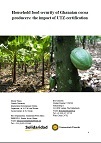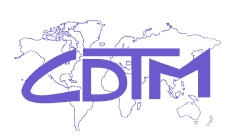
Household food security of Ghanaian cocoa producers : the impact of UTZ-certification
SCHOUTEN, Eva – Solidaridad ; Universiteit Utrecht, 2016, 64 p. - Site de studenttheses.uu.nl
Abstract : « This study focuses on food issues of cocoa farmers, as food security is one of the most important indicators for understanding overall socio-economic conditions of people and stunting and child mortality rates are proven to be high among producers. Food security within certification schemes is often seen as the outcome of increased income, though this study proves that both synergies and trade-offs exist when zooming in on the ways in which a farmer obtains food for the household. »
Mots clés : GHANA, CACAO, PRODUCTEUR, SECURITE ALIMENTAIRE, UTZ
Fair-Trade Certification : an Innovative Way to Fetch Better Income for Small and Marginal Farmers
International Journal For Technological Research In Engineering, 2016/08, vol.3, n°12, 4 p. - Site de ijtre.com
Abstract : « In India the small and marginal farmers are bitterly exploited by the middlemen.Farmers and workers at the beginning of the supply chain don’t always get a fair share of the benefits of trade. Fair-trade enables consumers to put this right.This article is trying to provide more inputs on the concept of fair trade, so that the farmer organizations can take initiatives for attaining fair trade certification which fetches better income for them. This also depicts the advantages of becoming a fair trade certified farmer. One of the astonishing facts realized during the meeting with producer organizations in Western Ghats is most of them are unaware about the concept of Fair Trade. This clearly indicates that necessary steps have to be taken by the concerned authorities to educate the farmers on modern business concepts such as Fair Trade, Farmer Producer Companies, etc. »
Mots clés : INDE, AGRICULTURE, PETIT PRODUCTEUR, COMMERCE EQUITABLE, CERTIFICATION, REVENU
BELAUSTEGUIGOITIA, Katalin Alciturri - Universidad de Valladolid, Facultad de Educación de Palencia, 2015-2016, 76 p. - Site de uvadoc.uva.es
Resumen : « Este Trabajo de Fin de Grado tiene como finalidad desarrollar un Proyecto de Educación en Valores centrado en la sensibilización sobre la importancia del Comercio Justo entre estudiantes de Enseñanza Secundaria Obligatoria. Vivimos en un mundo desigual e injusto donde no todas las personas tienen las mismas oportunidades de tener una vida digna, donde día tras día se están vulnerando los Derechos Humanos. Por ello, es fundamental educar a la ciudadanía y concretamente a los jóvenes en unos valores éticos donde prevalezca siempre la persona. Como sociedad debemos dotar de herramientas para crear conciencia crítica acerca de lo que está sucediendo y así poder posicionarnos, reivindicar y luchar de forma activa y pacífica por un mundo más justo para todas las personas. »
Mots clés : ESPAGNE, COMMERCE EQUITABLE, ETHIQUE, JEUNE, EDUCATION
CUIPAL, Luis ; MAURIOLA María - Universidad Privada Juan Mejia Baca, Carrera Profesional Ingenieria Comercial, Pérou, 2015, 144 p. - Site de repositorio.umb.edu.pe:8080
Resumen : « La Asociación San Juan Bautista de Kañaris, tiene como principal actividad la producción y comercialización de café, sin embargo, las condiciones de vida no se han visto mejoradas para los cafeticultores. Por ello, esta investigación cuantitativa con variables cualitativas plantea como objetivo determinar la situación actual de la “Asociación Ecológica San Juan Bautista” de Kañaris en el año 2014, para el logro de la certificación de Comercio Justo según los criterios dados por FLO-CERT y la OIT, estableciendo la hipótesis que a través de la adaptación de la Asociación en el año 2015, obtendrán la certificación Fairtrade, mejorando su situación económica, social y ambiental. Con un muestreo probabilístico-estratificado, de 104 productores de 285 socios. Se aplicó fichas de inspección tipo encuesta y tipo entrevista, observación y revisión documentaria. Se procesó datos a través de tablas y gráficos utilizando el Software SPSS 18. Los objetivos específicos fueron determinar la situación actual de los productores cafetaleros, identificar las condiciones de la asociación para certificar Comercio Justo, y determinar con que documentos de gestión interna cuenta la asociación. El resultado revela que la Asociación no alcanza los criterios mínimos ni obligatorios para la certificación de Comercio Justo, mostrando debilidades en los criterios de evaluación. Se concluye que la Asociación no puede acceder a dicha certificación, requiriendo realizar capacitaciones dirigidas a productores y directivos, para disminuir las deficiencias encontradas en los aspectos sociales, económicos y medioambientales, todo ello servirá para mejorar la calidad de vida de la Asociación. »
Mots clés : PEROU, PRODUCTEUR DE CAFE, FLOCERT, CERTIFICATION, ECHEC, FORMATION
NERVI, Agustin - Lincoln University (New Zealand), Master of Commerce, 2016, 118 p. - Site de researcharchive.lincoln.ac.nz
"Argentina plays a major role in the global honey market as the world’s second largest exporter behind China. About 70% of Argentine beekeepers are small to medium-sized. Consumers from affluent markets are increasingly aware of the processes involved in the production of the food they purchase. These consumers are willing to pay premiums for goods that have socially and environmentally sustainable production methods. Certification protocols such as Fair Trade and Organic give consumers confidence that these requirements are met. However, smallholders find it difficult to access these premiums as they produce small volumes and consequently face high unit compliance, transaction and marketing costs. This qualitative study aims to understand how the Fair Trade and Fair Trade Organic honey supply chains operate in the Tucumán and Santiago del Estero provinces of Northwest Argentina. A case study method and semi-structured interviews is utilised to collect data from key respondents. The analysis follows a pattern matching logic in order to compare patterns identified in the data with those predicted by the literature. A within-case analysis is performed for each case, followed by cross-case comparisons in order to recognise the advantages, disadvantages and constraints for increased smallholder participation in the study chains. The analysis suggests that despite benefits brought by collective action and market access, the Fair Trade and Fair Trade Organic chains did not provide substantial premiums to cover small beekeepers’ compliance, transaction and marketing costs. Information and power asymmetry, biophysical risk, geographical dispersion and institutional problems raised transaction and agency costs within organisations and between producers and buyers preventing long-term, sustainable relationships. This research provides solutions to reduce these costs and improve small beekeepers’ welfare. »
Mots clés : ARGENTINE, MIEL EQUITABLE, EXPORTATION, CERTIFICATION, COUT
Environment, Development and Sustainability, 2016, pp. 1-25 - Site de link.springer.com
Abstract : « This paper investigates multi-stakeholder arrangements initiated by businesses and NGOs from the North that aim to enhance a more sustainable agricultural production at specific localities in Southern countries. We aim to better understand the search for concerted action in multi-actor arrangements. Therefore, this paper presents a diagnostic framework with three strategic challenges the partnership projects are facing : linking global economic objectives to local needs, values and interests ; bridging public and private interests and responsibilities ; and seeking trade-offs between social, environmental and economic values. Starting from the partnerships’ Theory of Change, this diagnostic framework is applied to comparative case studies of partnership projects in the cocoa sector in Indonesia, which are part of a Northern-based public–private partnership to improve farmers’ prospective. It is concluded that the economic reality faced by the farmers differs from that of the Northern actors ; collaboration with governments is difficult because of different organizational cultures ; and the partnership projects underestimate the strength of vested social relations the smallholders are part of. Overall, the initiators of the partnerships seem to work with a too restricted economic interpretation of the local reality. «
Mots clés : INDONESIE, CACAO, AGRICULTURE DURABLE, ONG DU NORD, PRODUCTEUR, GOUVERNEMENT
VILAR PABLOS, Filomena – Universidad de Leon, 2016/09, 131 p. - Site de buleria.unileon.es
Resumen : "El objetivo de este trabajo de fin de grado es estudiar las razones de consumo y no consumo de productos de comercio justo entre los estudiantes de la Universidad de León. Para ello se realizó una encuesta a 400 estudiantes universitarios. Con el objetivo de simplificar y organizar el estudio, se dividió la muestra en:Pasado : individuos que compraron o no productos de comercio justo. Futuro : individuos que comprarían o no productos de comercio justo. El análisis se realiza, primero, para las variables del pasado y, después, se repite para las del futuro. De este modo, para ambos casos, inicialmente se extrajeron los estadísticos descriptivos ; después, se comprobó la normalidad mediante Lilliefors ; y, al tratarse de variables que rechazaban la hipótesis nula de normalidad, se realizó un contraste no paramétrico para k muestras independientes (la H de Kruskal Wallis). Después, se hizo una regresión logística binaria, para clasificar a los individuos en dos poblaciones que constituían la variable dependiente (comprar o no en el pasado y, posteriormente, en el futuro), mediante diversas variables independientes. Finalmente, se sacaron las frecuencias del resto de variables y se analizaron los tipos de establecimientos de comprasegún el sexo. »
Mots clés : ESPAGNE, LEON, ETUDIANT, CONSOMMATION RESPONSABLE, COMMERCE EQUITABLE
 CDTM de Paris
Centre de ressources sur le commerce équitable
CDTM de Paris
Centre de ressources sur le commerce équitable
